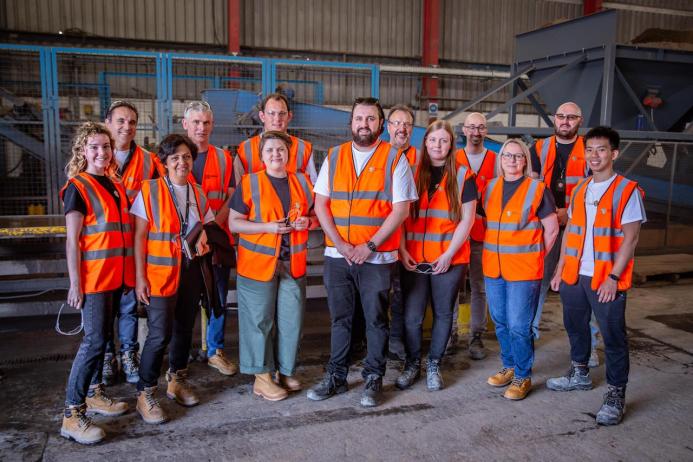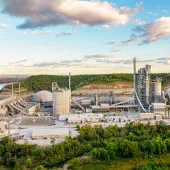Material Evolution set to roll out ultra-low-carbon cement
Groundbreaking ultra-low-carbon cement operation aims to accelerate construction’s journey to net zero
A TEESSIDE-based operation to mass produce ultra-low-carbon cement is at the cusp of an industry breakthrough, rapidly transforming our built environment and the way cement is produced and specified.
Material Evolution, the driving force behind the £7.6 million Mevocrete project, funded by Innovate UK through the Transforming Foundation Industries (TFI) Challenge programme, has worked closely with academic and industrial partners to develop and optimize their ultra-low-carbon geopolymer cement technology for production at scale.
The business, based in Middlesbrough, is set to take a major step forward this October, rolling out its pioneering ultra-low-carbon cement into production at its first manufacturing site in Wrexham.
Material Evolution say the move will make them the biggest producer of low-carbon cement in the UK.
Through the Mevocrete project, Material Evolution are also set to deliver a carbon-negative cement, which the business is working on bringing into production at the Wrexham factory.
Today its solution provides up to 85% less embodied CO2 than traditional Ordinary Portland Cement (OPC), while maintaining quality and workability, with the business aiming to deliver 150,000 tonnes of cement annually.
The firm plans to replicate and scale its production process across the UK and Europe, generating excitement among concrete specifiers and producers about the potential for embedded carbon reductions, according to Prof. David Hughes, CSO at Material Evolution and co-lead of the Mevocrete project.
Mr Hughes said: ‘This project really is a collaborative journey for a more positive carbon-neutral built environment which, through Mevocrete and new technology, sees an untapped supply of historic by-products from heavy industry diverted away from landfill.
‘Concrete is ubiquitous in nature being the second most used material on earth, and is one of the world’s biggest contributors to CO2 emissions, so presenting solutions for its decarbonization is at the heart of circular efforts within the construction industry.
‘Cement is a binder and what we’re looking at here is creating a net-zero-embodied carbon cement which is inherently more durable, which means our houses, infrastructure and transport highways would be transformed on mass industry scale, really tapping into a local and national picture of a net-zero environment.
‘We’re already having conversations with leading contractors, architects, government agencies, and institutions that ultimately have a huge say in the way cement is made and specified.
‘We’re providing the means to a greener future, taking industrial waste from landfills and powering it into something new, sustainable, and less carbon intensive.’
Material Evolution’s journey has been accelerated through revisions to the industry standard for concrete, BS 8500, which was revised in October 2023 by the British Standards Institution (BSI).
The revision provides greater flexibility for producers to use up to 65% less OPC replacement by two or more low-carbon cementitious materials, thereby helping both producers and specifiers in the concrete industry.
The new BSI Code of Practice Flex 350 also allows for the specification of a wider range of lower-carbon concretes to help decarbonize construction projects.
Material Evolution were founded in 2017 by Dr Liz Gilligan and Sam Clark, and are currently taking part in Mevocrete trials with Spanish steel recycling company Celsa to further advance their development journey.
Ms Gilligan said: ‘We are on a mission to rapidly and radically decarbonize the construction industry, by creating a product that emits 85% less carbon than traditional OPC, followed by our net-zero-carbon cement which we are working on scaling into production.
‘In just a few years, we’ve achieved a remarkable position within the industry, and soon we’ll be able to launch our first industrial-scale cement factory in Wrexham, working at volume – delivering a product that’ll enable today’s contractors, engineers and architects to build a greener tomorrow.
‘Our ultimate goal is to remove one gigaton of carbon by 2040, and these ambitious targets are driving our research forward with likeminded collaborators across various industries as we continue to accelerate the net-zero agenda.’
The Mevocrete project is set to conclude at the end of 2024, positioning Material Evolution as a leader in green cement within the £500 billion per annum concrete industry.










